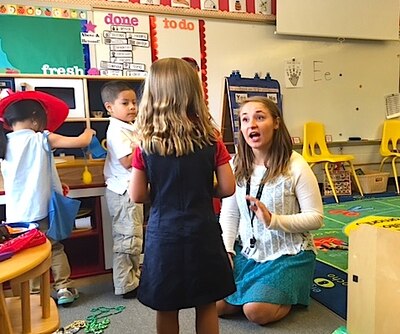The sunny preschool classroom at Fairview Elementary looks and sounds pretty typical.
In one corner, children play dress-up with hats, goggles and necklaces. Across the room, three children chatter as they count colorful plastic bears.
But what makes this preschool room different from most others in Colorado is how it came to be.
The classroom — along with six others sprinkled throughout Westminster Public Schools — was born out of a new financing model that many observers believe could provide critical funding for early childhood programs while saving taxpayer money in the long run.
It’s called Pay For Success financing.
The idea is that private investors or philanthropists pay upfront for proven social programs such as preschool for low-income children. If those programs save public money by preventing costly services such as special education, the investors are repaid with interest. If a project doesn’t yield the hoped-for savings, the investors lose some or all of their money.
The model has been around for about six years—used first in England for a program aimed at reducing recidivism, and thus pricey prison stays. In recent years, it’s caught on in the United States, with groups in Salt Lake City and Chicago using it to pay for preschool. Denver is using the mechanism to combat chronic homelessness.
The pilot project in Westminster Public Schools, which launched with a half-million dollars from two foundations, is not a full-fledged Pay For Success project because it doesn’t include the typical provision that investors get fully repaid if the program succeeds.
Still, district officials and consultants say it incorporates several components of the model, including a rigorous evaluation by an outside contractor to measure impact.
For Colorado’s early childhood community, the project provides the first real-life test of key parts of the complicated funding mechanism.
“It’s definitely a milestone,” said Mary Wickersham, a consultant who’s worked on the project. “I think very much that the state and other districts will be watching the pilot pretty closely.”
The purpose of the project is to compare the impact of the district’s new full-day preschool program to the half-day program it’s offered for years.
If—as national studies suggests—the full-day offering means bigger learning gains for low-income students, administrators hope to expand the pilot into a full-blown Pay For Success project.
“You would have a really great blueprint for districts across the state to adopt similar models,” Wickersham said.
Quick turnaround
While Westminster’s seven new full-day preschool classrooms have been up and running since the school year began, workers are still adding finishing touches like age-appropriate playgrounds at some schools.

The last-minute hustle bustle illustrates just how much of a whirlwind the Pay For Success journey has been for the district. It all began just over a year ago when the district won a federal grant that allowed it to hire an expert to study the feasibility of Pay For Success work.
That expert was Billy Powers, now a senior policy associate for the Sorenson Impact Center at the University of Utah. When he started his year-long stint in Westminster in July 2015, the effort was a “purely theoretical exercise,” he said.
The goal was to make the district’s preschool offerings into something more substantial. About 80 percent of the district’s students come from low-income families, so the traditional four days of half-day preschool didn’t seem like enough for the children or their working parents.
That said, the price tag for full-day preschool five days a week was formidable. Not only is it more expensive than other grades because of student-teacher ratio requirements and class size caps, but state funding for at-risk preschoolers is mostly for half-day slots.
That’s where two Denver-based funders came in—Gary Community Investments and the Ben and Lucy Ana Walton Fund of the Walton Family Foundation. Together, they contributed $500,000 for the first year of the pilot, and will give additional dollars next year. (The Walton Family Foundation and Gary Community Investments — through the Piton Foundation — are Chalkbeat funders).
“It becomes super-expensive, which is why we needed this offset or we couldn’t have pulled this off,” said Mat Aubuchon, the district’s director of early childhood education.
About 400 families vied for the 112 full-day slots available for 4-year-olds this year. While some slots are tuition-based, the vast majority are free for families and were awarded through a lottery.
No repayment this time
In a true Pay For Success transaction, Gary Community Investments and the Walton fund would recoup their money if the full-day preschool program helped the school district and state avoid certain costs — say, those associated with special education services or providing extra help to struggling readers and English Language Learners.

But that won’t happen in this case—at least not fully. That’s because district administrators and consultants didn’t believe they had strong enough data to support their predictions and didn’t ask the state—likely a key partner in the repayment role—to sign on.
Even so, the project will give district officials, the two funders and other interested parties useful insights into whether full-day preschool is a viable Pay For Success project.
For example, the outside contractor’s planned study of the preschool project — using a gold-standard randomized control trial — will provide clear data on full-day preschool outcomes such as kindergarten readiness and frequency of special education referrals.
In addition, district officials will carefully track any savings gleaned from the full-day preschool program just as they would in a true Pay For Success project.
They may pay a portion of the original $500,000 back to the two foundations, but the official project agreement also allows the funders to re-invest any savings back into the program, Aubuchon said.
Other projects in the works
As Westminster’s preschool pilot unfolds this year, other early childhood Pay For Success projects are in development across the state.
The Early Childhood Council of Boulder County is studying the possible expansion of a home-visiting program—the Community Infant Program—that aims to prevent child abuse and neglect. In addition, an Adams County nonprofit, Growing Home, is considering expansion of a different home-visiting program called Parents as Teachers.
“There’s a lot of Pay For Success activity in Colorado and there’s a lot that makes Colorado stand out nationally,” Wickersham said.
Among 57 projects that have been seeded with federal planning grants, nine are in Colorado.
There’s also an active group of prospective Pay For Success funders here, she said. They began meeting more than two years ago, originally focusing on early childhood efforts, but branching out since then.
Wickersham said the group, of which both Gary and Walton are part, “is to my knowledge completely unique nationally…so much so that even the folks from the White House say that it is a tremendous element of the Colorado landscape that most states don’t have.”


